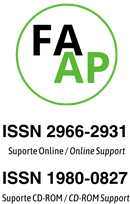Typology and Trends in Links between Solid Waste Management and Public Policy
A Systematic Literature Review
DOI:
https://doi.org/10.17271/1980082720120245277Keywords:
Typology, Solid waste management, Public policiesAbstract
Objective – to propose, through a systematic literature review, a typology and discuss trends about the relation between solid waste management and public policies, since there was no work found with such a scope. Methodology – The research is exploratory, with a quantitative approach for bibliometric analyses, and a qualitative approach with content analysis, for adherence of the articles to the finished corpus and discussion on typology results. Results – Corpus production index analysis showed that interest on the theme keeps growing. Bibliographic coupling put into evidence an interactive connection network, in which the main works have satisfactory links with each other, both in numbers and total strength, demonstrating cooperation between theory and methodology. The theme map displayed emergent themes on “municipal solid waste management”, basic themes on “pickers” and “circular economy”, niche themes such as “environmental management” and “public policies” and motor themes, especially “waste management”, in which the relationship between the Keywords, organized by betweenness centrality, spawned the typography. Theory and methodology contributions – typology building happened with no biases, representing advancements on the knowledge basis. Social and environmental contributions – discussion on typology results evidenced trends for participation and collaboration from all social actors (pickers, cooperatives, companies, government) on solid waste management, thus embracing environmental responsibility.
Downloads
Downloads
Published
Issue
Section
License
Copyright (c) 2024 Electronic Journal "Fórum Ambiental da Alta Paulista"

This work is licensed under a Creative Commons Attribution 4.0 International License.












